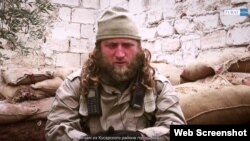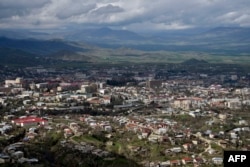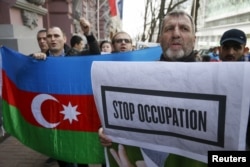He calls himself Abdulla the Caucasian. With fair skin, red hair, a long beard and gold-toothed smile, wearing military-style attire and hugging his assault rifle, Abdulla speaks Azerbaijani during the half-hour long Islamic State propaganda video. His monologue has been translated into Russian, with Cyrillic subtitles running across the screen. He promises hell on Earth to Azerbaijan's government and its Muslim leaders who oppose IS.
The video is different from the jihadist videos usually produced by the IS Russian-language propaganda team. Instead of being a long address by a well-known figure, or presentations by a group of jihadist notables, this one tells a story - an individual narrative with an accompanying visual presentation.
IS recruitment
As in dozens of other jihadist propaganda videos, Abdulla the Caucasian speaks to his kin — young Muslims in the Caucasus; however, his speech is more a story than a direct call to action, providing young, easily radicalized minds with everything they would want in their dream of becoming warriors for jihad.
In scene after scene, the camera follows him as he fires toward enemy positions using various automatic weapons; he rides a motorcycle through the battle-ravaged neighborhoods, passing the unburied bodies of IS victims; he checks the ID's of the freshly-killed “infidels” brought to him by his subordinates; he pays a courtesy visit to an elderly local woman; he steps on the petrified skull of a defeated enemy, while promising a place in paradise to those who join IS.
The carefully selected footage and words aim to deliver a simple message: Back home I was a nobody; here I am a warlord.
Despite repeated efforts to delete it from public platforms, the video keeps reappearing in jihadist forums and social media groups. It has become one of the most popular propaganda videos ever produced by IS' Russian-language team.
Measuring the impact of such propaganda statistically is impossible; however, it is worth noting that Vadim Osmanov, one of the bombers who carried out the attack at Istanbul's Atatürk Airport on June 28, was a Lezgin – the same Sunni Muslim ethnic group to which Abdulla the Caucasian belongs.
In the IS video in which he appears, Abdulla, besides speaking in Azerbaijani, speaks briefly in his native Lezgin language, calling on his ethnic brethren to carry out attacks wherever they are, if they are unable to travel to Iraq or Syria and join IS.
While there is no proof Osmanov was responding to Abdulla's call, previous charismatic figures from certain ethnic groups have boosted recruitment among their ethnic kin, who then form sub-groups inside jihadist networks.
Abdulla the Caucasian's video has even reached his home village in Azerbaijan.
“Everybody in Urva knows about that video,” said Sevleddin Eskindarov, head of administration of the northern Azerbaijani village of Urva, in a telephone interview with VOA from his office.
Soldier turned warlord
With about 3,000 residents, Urva is considered a “big” village in the northern Azerbaijani district of Qusar, near the border with Russia’s republic of Dagestan.
Urva’s relationship with Dagestan is not simply a matter of geography: its residents are Lezgins, who are native to southeast Dagestan. Lezgins on both sides of the Dagestani-Azerbaijani border consider each other kin, maintaining close ties through marriages and clan-family relations.
Eskindarov identified Abdulla the Caucasian as an Urva native. “Yes, I know the man," he said. "His name is Yurik Khasiev, Gulmirzaoglu [son of Gulmirza]” Khasiev, he said, was born and raised in Urva, and before moving to Syria, left the village only once — to serve in the Azerbaijani army.
“He was trouble even before he left for Syria — always wearing his red beard and not going to the mosque," Eskindarov said. "A Wahhabist.”
Officials in Russia and other former Soviet states often use the term "Wahhabists," which refers to adherents of the ultraconservative brand of Islam that governs Saudi Arabia, as a blanket term for any Islamic fundamentalists.
Eskindarov quickly added that there were only four “Wahhabists” in his village and all of them left to fight for IS a few years ago. Now, Urva has “no such problem as extremism or radical Islam," he said
Eskindarov said Khasiev’s parents and siblings still live in Urva, and are aware of his whereabouts. “He did not cut his family off, they are talking over the Internet all the time,” he said, adding,“Everybody in Urva knows about him, and nobody likes what he has become, including his family."
The Azerbaijani government responded to Khasiev's threat on the IS video with an official statement saying that state security did not regard such threats as “serious.” Azerbaijan's State Committee for Work with Religious Organizations issued a statement promising that Sheikh ul-Islam Allahshukur Pashazade, the chairman of the Caucasus Muslims organization who was personally threatened in the IS video, would be safe and protected.
Azerbaijani authorities did not respond to a VOA request for comment.
The Soufan Group, a New York-based security consulting firm, estimates that as of 2014, 216 Azerbaijanis were fighting with IS in Syria and Iraq. In a report issued earlier this year, the Washington-based Heritage Foundation put the number of Azerbaijani fighters in IS at about 300, noting that an Azerbaijani wrestling champion was killed fighting for the group in 2014.
In a 2014 video, the then-leader of the Islamic State's Azerbaijani fighters claimed they were based in Raqqa, the de facto IS capital in Syria. He said they lived in a community under sharia law and had established madrassas Islamic schools for their children.
Since Turkey started taking stricter measures to control its border with Syria, the outflow of jihadists from Azerbaijan has been reduced significantly, Martin Reardon, a Soufan Group senior vice president, told VOA in a phone interview from Doha.
He added, however, that with IS losing ground in Iraq and Syria, “there are reports of Azeri fighters going home and they are going to be a serious security threat there, because they have been hardened on the battlefield and by IS ideology, and they are returning to continue fighting at home."
Reardon said the IS goal in Azerbaijan, as in many other regions, is to spread its influence by establishing a local network. "But, as a brand, IS will not survive much longer; once the people see the caliphate is a proto-state they will defect," he said. "The ideology, however, will remain a long-term security threat."






